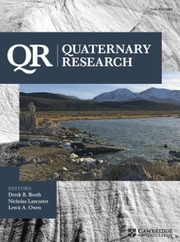Crossref Citations
This article has been cited by the following publications. This list is generated based on data provided by
Crossref.
Jaworowski, Cheryl
Heasler, Henry
Neale, Christopher
Saravanan, Sivarajan
and
Masih, Ashish
2013.
Temporal and Seasonal Variations of the Hot Spring Basin Hydrothermal System, Yellowstone National Park, USA.
Remote Sensing,
Vol. 5,
Issue. 12,
p.
6587.
Schaetzl, Randall J.
and
Luehmann, Michael D.
2013.
Coarse-textured basal zones in thin loess deposits: Products of sediment mixing and/or paleoenvironmental change?.
Geoderma,
Vol. 192,
Issue. ,
p.
277.
Moska, Piotr
and
Bluszcz, Andrzej
2013.
Luminescence dating of loess profiles in Poland.
Quaternary International,
Vol. 296,
Issue. ,
p.
51.
Sionneau, T.
Bout-Roumazeilles, V.
Meunier, G.
Kissel, C.
Flower, B.P.
Bory, A.
and
Tribovillard, N.
2013.
Atmospheric re-organization during Marine Isotope Stage 3 over the North American continent: sedimentological and mineralogical evidence from the Gulf of Mexico.
Quaternary Science Reviews,
Vol. 81,
Issue. ,
p.
62.
Ouimet, William
Dethier, David
Bierman, Paul
Wyshnytzky, Cianna
Shea, Neil
and
Rood, Dylan H.
2015.
Spatial and temporal variations in meteoric 10Be inventories and long-term deposition rates, Colorado Front Range.
Quaternary Science Reviews,
Vol. 109,
Issue. ,
p.
1.
Jagercikova, M.
Cornu, S.
Bourlès, D.
Antoine, P.
Mayor, M.
and
Guillou, V.
2015.
Understanding long-term soil processes using meteoric 10Be: A first attempt on loessic deposits.
Quaternary Geochronology,
Vol. 27,
Issue. ,
p.
11.
Otvos, Ervin G.
2015.
The Last Interglacial Stage: Definitions and marine highstand, North America and Eurasia.
Quaternary International,
Vol. 383,
Issue. ,
p.
158.
Dar, Reyaz Ahmad
Chandra, Rakesh
Romshoo, Shakil Ahmad
Lone, Mahjoor Ahmad
and
Ahmad, Syed Masood
2015.
Reply to the comment by Shah on “Isotopic and micromorphological studies of Late Quaternary loess-paleosol sequences of the Karewa Group: inferences for palaeoclimate of Kashmir Valley”.
Quaternary International,
Vol. 374,
Issue. ,
p.
200.
Larsen, Darren J.
Finkenbinder, Matthew S.
Abbott, Mark B.
and
Ofstun, Adam R.
2016.
Deglaciation and postglacial environmental changes in the Teton Mountain Range recorded at Jenny Lake, Grand Teton National Park, WY.
Quaternary Science Reviews,
Vol. 138,
Issue. ,
p.
62.
Oerter, Erik J.
Sharp, Warren D.
Oster, Jessica L.
Ebeling, Angela
Valley, John W.
Kozdon, Reinhard
Orland, Ian J.
Hellstrom, John
Woodhead, Jon D.
Hergt, Janet M.
Chadwick, Oliver A.
and
Amundson, Ronald
2016.
Pedothem carbonates reveal anomalous North American atmospheric circulation 70,000–55,000 years ago.
Proceedings of the National Academy of Sciences,
Vol. 113,
Issue. 4,
p.
919.
Jordanova, Neli
2017.
Soil Magnetism.
p.
29.
Licciardi, Joseph M.
and
Pierce, Kenneth L.
2018.
History and dynamics of the Greater Yellowstone Glacial System during the last two glaciations.
Quaternary Science Reviews,
Vol. 200,
Issue. ,
p.
1.
Muhs, Daniel R.
Bettis, E. Arthur
and
Skipp, Gary L.
2018.
Geochemistry and mineralogy of late Quaternary loess in the upper Mississippi River valley, USA: Provenance and correlation with Laurentide Ice Sheet history.
Quaternary Science Reviews,
Vol. 187,
Issue. ,
p.
235.
Palmquist, Robert C.
2019.
Alluvial fan sediments and surface ages resulting from differing climatic and tectonic conditions in Star Valley, Wyoming, USA.
CATENA,
Vol. 181,
Issue. ,
p.
104050.
Roehner, Clayton
Pierce, Jennifer L.
and
Yager, Elowyn M.
2020.
Spatial and temporal changes in aeolian redistribution of sediments and nutrients following fire.
Earth Surface Processes and Landforms,
Vol. 45,
Issue. 11,
p.
2556.
Laabs, Benjamin J.C.
Licciardi, Joseph M.
Leonard, Eric M.
Munroe, Jeffrey S.
and
Marchetti, David W.
2020.
Updated cosmogenic chronologies of Pleistocene mountain glaciation in the western United States and associated paleoclimate inferences.
Quaternary Science Reviews,
Vol. 242,
Issue. ,
p.
106427.
Jia, Jia
2020.
Magnetic properties of upper Paleozoic loessite-paleosol couplets in the Western USA: The role of pedogenic hematite in magnetic enhancement.
Quaternary International,
Vol. 544,
Issue. ,
p.
57.
Gaylord, David R.
Rittenour, Tammy M.
Link, Paul K.
Turrin, Brent D.
and
Kuntz, Mel A.
2021.
Ghost-dune hollows of the eastern Snake River Plain, Idaho: Their genesis, evolution, and relevance to Martian ghost-dune pits.
Geology,
Vol. 49,
Issue. 8,
p.
899.
Honke, Jeffrey S.
Pigati, Jeffrey S.
and
Daniels, J. Michael
2021.
Evidence of glacial activity during MIS 4 in the Rocky Mountains, Colorado, USA.
Arctic, Antarctic, and Alpine Research,
Vol. 53,
Issue. 1,
p.
252.
Tuzlak, Daphnee
Pederson, Joel
Bufe, Aaron
and
Rittenour, Tammy
2022.
Patterns of incision and deformation on the southern flank of the Yellowstone hotspot from terraces and topography.
GSA Bulletin,
Vol. 134,
Issue. 5-6,
p.
1319.


